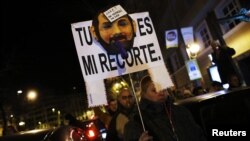SEVILLE —
As Spain's prime minister faces calls to step down amid accusations of corruption, new figures show unemployment rose in January to an all-time high. London's Financial Times newspaper notes the political scandal couldn't come at a worse time for the country.
Spain’s embattled ruling party is in full defense mode, following accusations that the Partido Popular, or PP, kept secret ledgers hiding donations, mostly from construction firms, that were funneled to top officials.
The party’s deputy secretary, González Pons, told Spanish public television Monday the handwritten ledgers published by the newspaper El País last week, which allegedly show a parallel bookkeeping system, are not credible.
Allegations of corruption against the PP erupted several years ago, but fingers mostly pointed at local politicians, until now.
The documents obtained by El País, covering the years 1990 to 2009, seem to indicate that prior to becoming prime minister, Mariano Rajoy received $34,000 annually, for about a decade.
Former PP treasurer Luis Bárcenas, who has been under investigation since 2009, told Antena 3 television Monday it’s all a sham.
There were no secret books, he says.
After a party meeting to discuss the corruption crisis over the weekend, Prime Minister Mariano Rajoy denied to reporters having benefited from kickbacks and promised to publish his tax declarations on the Internet.
But both the small United Left party and the Spanish Socialist Workers' Party have called on the prime minister to step down.
Socialist leader Alfredo Pérez Rubalcaba says Rajoy is a burden now.
In an editorial, London’s Financial Times says the prime minister “faces the fight of his life,” a scandal that couldn't come at a worse time.
Unemployment went up 2.7 percent in January over December.
There are close to 5 million Spaniards out of work now, 8 percent more than at the same time last year.
Although the austerity measures adopted in the last year have appeased the markets, public support for the government has dropped sharply.
Faced with trying to pull Spain out of the worst economic crisis of its democratic history, the government now has to manage a crisis of confidence.
Mariano Rajoy couldn’t escape questions on the issue in Berlin today.
Visiting with German Chancellor Angela Merkel, the prime minister reiterated vigorously that the allegations against him are untrue and that he remains committed as ever to steer Spain towards recovery.
Spain’s embattled ruling party is in full defense mode, following accusations that the Partido Popular, or PP, kept secret ledgers hiding donations, mostly from construction firms, that were funneled to top officials.
The party’s deputy secretary, González Pons, told Spanish public television Monday the handwritten ledgers published by the newspaper El País last week, which allegedly show a parallel bookkeeping system, are not credible.
Allegations of corruption against the PP erupted several years ago, but fingers mostly pointed at local politicians, until now.
The documents obtained by El País, covering the years 1990 to 2009, seem to indicate that prior to becoming prime minister, Mariano Rajoy received $34,000 annually, for about a decade.
Former PP treasurer Luis Bárcenas, who has been under investigation since 2009, told Antena 3 television Monday it’s all a sham.
There were no secret books, he says.
After a party meeting to discuss the corruption crisis over the weekend, Prime Minister Mariano Rajoy denied to reporters having benefited from kickbacks and promised to publish his tax declarations on the Internet.
But both the small United Left party and the Spanish Socialist Workers' Party have called on the prime minister to step down.
Socialist leader Alfredo Pérez Rubalcaba says Rajoy is a burden now.
In an editorial, London’s Financial Times says the prime minister “faces the fight of his life,” a scandal that couldn't come at a worse time.
Unemployment went up 2.7 percent in January over December.
There are close to 5 million Spaniards out of work now, 8 percent more than at the same time last year.
Although the austerity measures adopted in the last year have appeased the markets, public support for the government has dropped sharply.
Faced with trying to pull Spain out of the worst economic crisis of its democratic history, the government now has to manage a crisis of confidence.
Mariano Rajoy couldn’t escape questions on the issue in Berlin today.
Visiting with German Chancellor Angela Merkel, the prime minister reiterated vigorously that the allegations against him are untrue and that he remains committed as ever to steer Spain towards recovery.




